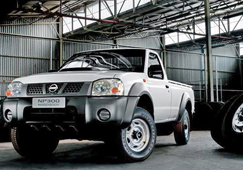Investing in South Africa
Nissan works at keeping it local
Responding to challenges
However, Nissan South Africa said it was partnering with local suppliers to respond to this challenge, including facilitating linkages between local and global parts suppliers. In addition to this, benchmarking of cost structures allows for the identification of focus areas to reduce cost, made possible by the power of the Renault Nissan Purchasing Organisation – the alliance partnership between the two automotive manufacturers. "In this way we work with suppliers to become globally competitive, with the aim of ensuring sustainability of the local industry," Haasbroek said. Another challenge for local suppliers is the advantage that some global suppliers have in countries with a high total industry volume, which allows for competitive costs structures and improved efficiencies. "So the local supplier base has challenges in terms of model complexities and short production runs due to - comparatively speaking - low volumes in South Africa," Haasbroek said. "However, this can be overcome by being innovative, flexible and resilient."Increasing local content
There is a relationship between the level of local content and the specific vehicle project: "A project with a relatively short model life and/or relatively low volumes will not attract high levels of local content," Haasbroek said. "Conversely, a project with higher volumes and longer remaining model life provides more opportunity to pay back the investment of localising." For this reason, local content on the Hardbody range, a Nissan SA mainstay, has significantly higher local content than some other vehicles, coming in at almost 60%, and Haasbroek said the company was aiming to increase local content in the vehicle by an additional 7%. Nissan South Africa's localisation strategy is in alignment with the objectives of the Automotive Production and Development Programme (APDP), effective from 2013 onwards, which will offer incentives to manufacturers who produce in excess of 50 000 vehicles. "In order to increase production volume - a Nissan target going forward to meet APDP requirements - we are driving hard to increase local content to above an average of 60% on key models while maintaining globally competitive cost structures," Haasbroek said. SAinfo reporter
Would you like to use this article in your publication or on your website? See: Using SAinfo material

Nissan's new one-ton pick-up range, due to start production in the second half of 2014, is set to replace the Hardbody (Photo: Nissan South Africa)
Related links
Related articles
- GMSA unveils R900m local investment
- Punting a new model for auto industry
- BMW to invest R2.2bn in Rosslyn plant
- VWSA's engine export milestone
- The Joule: Africa's first all-electric car
- Auto parts suppliers in R1bn investment
- New auto incentive plan approved
- Renault-Nissan to invest R1bn in SA
- Ford secures Africa export contract
- Toyota SA 'a global producer'
- Ford to invest R1.5bn in SA
- New Benz to boost auto exports
- Fiat SA lands R700m export deal




